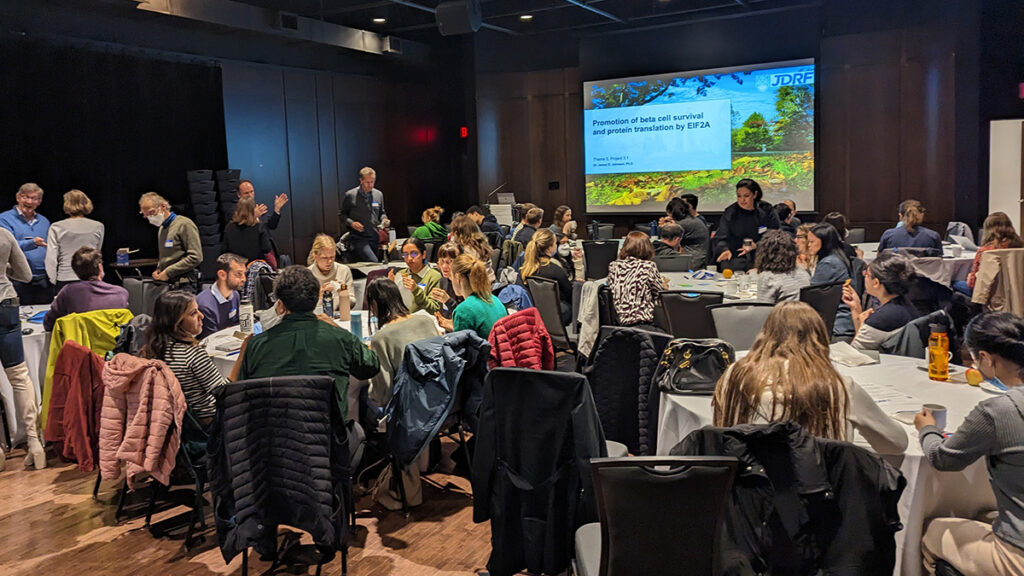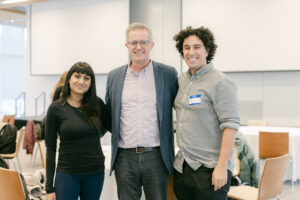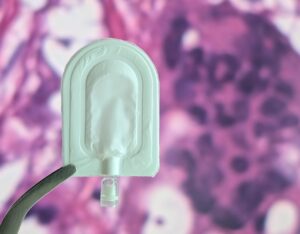
December 2021 marked the launch of the JDRF Centre of Excellence at the University of British Columbia (UBC). One year later, a team of over 40 researchers convened in person at UBC for the first annual meeting to review and celebrate progress, translate knowledge, engage with the type 1 diabetes (T1D) community, and discuss what the future holds for this exciting research initiative.
On November 3rd, 2022, researchers, clinicians, trainees, members of the T1D community, and JDRF staff assembled for the JDRF Centre of Excellence’s first annual meeting at The Nest on UBC campus. The full-day event included a review of year 1 scientific progress across the Centres research projects and cores, knowledge translation presentations led by trainee researchers from the Centre, engagement sessions involving researchers and the T1D community, and discussions about the future plans of the Centre’s research program.
“The annual meeting was an inspiring day where Centre researchers shared progress from our first year of operation, and patient partners shared their stories of living with T1D,” said Bruce Verchere, one of the project leads at the Centre. “We concluded the meeting energized and with new ideas to carry on the Centre’s important work in Year 2!”
The Centre’s research program, which is exclusively focused on T1D cure research, has seen important progress across all of its three main themes. In Theme 1, led by Dr. Francis Lynn and focused on building better beta cells for islet replacement therapy, the research team identified improved systems and growth conditions for scaling up the manufacture of stem cell-derived beta-like cells in the lab. They also carried out crucial groundwork to enable screens in Year 2 that will aim to identify molecules that will improve the survival and function of stem cell-derived beta-like cells during lab-based manufacturing.
In Theme 2, led by Dr. Megan Levings and focused on protecting insulin-producing beta cells from immune attack, the team discovered that insulin seems to impair the function of T regulatory cells (Tregs) – a special type of immune cell that suppresses autoimmune and inflammatory responses – and are now working to immune-engineer Tregs so that they work optimally to shut down unwanted immune responses in the insulin-rich environment of the pancreas. Theme 2 researchers also began testing a new therapeutic approach involving lipid nanoparticles (the same technology used for mRNA-containing COVID-19 vaccines) designed to stop the autoimmune attack of beta cells, with the aim of preserving insulin production.
In Theme 3, led by Dr. Jim Johnson and focused on targeting and monitoring beta cell stress (a potential contributing factor to T1D), the team made key advances in understanding stress protection mechanisms in beta cells that might open up new therapeutic opportunities. The team also discovered that an enzyme called PC1/3, which is involved in the production of the insulin hormone, is impaired prior to a T1D diagnosis, providing new insight into the early stages of T1D development.
“The goal of a JDRF Centre of Excellence was to create something that is more than the sum of its parts – and that was evident in the progress achieved during Year 1,” said Dr. Sarah Linklater, JDRF Canada’s Chief Scientific Officer. “JDRF is proud to be supporting this innovative team, and excited about the pace and direction of the research program.”
The day also included formal announcement of two new $20,000 seed grants funded to UBC investigators through the Centre, awarded through a competitive process designed to expand the scope of the Centre’s research program and bring young new investigators into the collaborative research team. Dr. Dan Luciani was successful in securing a grant to investigate the potential of a protein called TFEB as a new therapeutic target in T1D. Dr. Hongshen Ma will use his grant to develop a new tool for measuring insulin production at the single cell level and apply this to understand the molecular function and heterogeneity of islets and stem cell-derived islets. These high-risk, high-reward projects will synergize with ongoing projects at the Centre will report their results at next year’s annual meeting.
The highlight of the day was undoubtedly the afternoon’s knowledge translation session, when 9 of the Centre’s junior trainees shared the goals and potential impact of their projects in 3-minute verbal presentations intended for a lay audience. These oral presentations were based on written summaries about the trainees’ research projects, also intended for a lay audience, circulated before the meeting. The oral presentations were followed by an opportunity for trainees and people with lived experience of T1D to share perspectives on what it means to live with T1D, what a cure would mean, and how researchers and the T1D community can better work together to accelerate research.
“Working in the lab and pondering basic biology, it can be easy to lose touch with the broad impact of our day-to-day science,” said Natalie Nahirney, a graduate student in Dr. James Johnson’s lab. “It was a great experience to meet individuals and families affected by type 1 diabetes, and opportunities like this are an important reminder of the real motivation behind our research.”
“As a parent of a child with T1D, there is nothing more that I want than to be able to take this disease, the worry, and the burden, away for my son,” said JDRF volunteer Angela Barrington-Foote, who attended the event. “Reading about all the research being done is one thing, but to physically be in a room full of brilliant minds, watching them collaborate and talk about what they are doing and the advancements they have made – I was in awe. And to be able to share my lived experience to bring value and meaning to all the effort and work being done was very rewarding. I left at the end of the day full of gratitude, appreciation, hope, and excitement for my son’s future!”
Future plans for the Centre are focused on the overall goal of bringing new cure therapies to the clinical testing stage. Read more about the Centre here or at UBC’s new dedicated webpage at jdrf.med.ubc.ca



